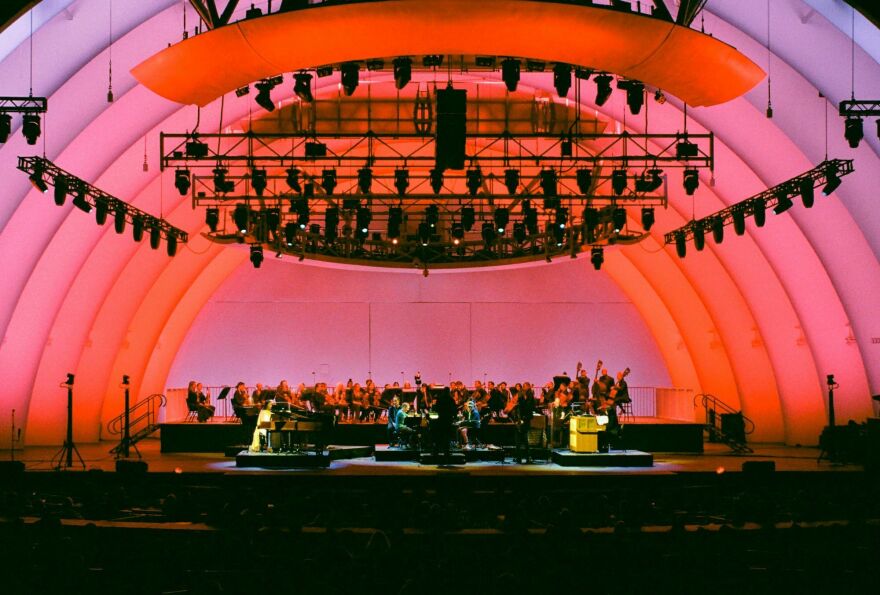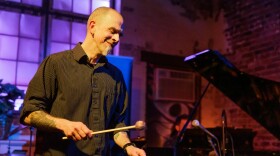Autumn is here in the Western hemisphere, and with it the anniversary of the birth of John Coltrane, Sept. 23rd, a jazz holiday I call Coltrane's equinox. It's the season when Black improvised music sounds the most lush, most like itself, as if its acoustics are designed for the late September comedown from summer, a reprieve from the thick, almost discouraging heat. There is something about the texture of the air and the vague amber light in the sky and the idea of the inventors of the style woodshedding in New York clubs around this time, in its nascent years. Fall is when jazz folklore and hagiography make the most sense; a persistent but fleeting beauty, not unlike the music, emerges from the thinning air and won't let up for months. We fall in love under the dread of winter and everything is at once more and less intense than it was just weeks before. The personality of jazz music is autumnal — moody, social, cerebral and reserved even while in its butterfly era for a seeming eternity. The great saxophonist Pharoah Sanders was born in October, and he and John Coltrane were close friends, soul brothers; this is their season, an endless rebirth of their shared tonal universe.
It's the right time to reissue Pharoah Sanders' 1977 album Harvest Time, which previously circulated as bootlegs and lore. As if echoing their relationship, the Sanders and Coltrane families are friends, and I'm with members of both families on an almost-crisp late September evening in Los Angeles to listen to the full album at one of the city's hi-fi bars, In Sheep's Clothing. The label Luaka Bop has helped curate the event to honor the reissue they produced, but really to honor Sanders. Some of the visual contents of the new LP edition are projected onto an outdoor wall while his daughter Naima delivers a short improvised speech about her dad. She wears parts of his face, the high regal cheekbones, the light and recoil in her eyes. The gist of what she says to the small, deeply attentive audience is that he taught her how to love. "Love will find a way," he chants on the album's crescendo. He taught many of us, the feeling in the crowd affirms, and when he passed, almost exactly a year ago to the day of that listening event, it did feel like an aspect of the love frequency would become harder to access in sound, here on earth. Pharoah Sanders himself was that aspect, and when he played he could make a room swirl and swoon with a new capacity for communion. It was almost frightening, the stagnancy he could upend and replace with calm exhilaration.
Harvest Time first arrived when he was in limbo, between stardom and the denouement of jazz stardom all together, when arena shows were growing popular and replacing small dives and clubs. Miles Davis would play the large theaters and even opened for Laura Nyro at San Francisco's Black Hawk venue. Jazz musicians were being nudged from popular and accessible to elite and remote as the cultural zeitgeist grew just a little more frivolous and vulgar, indulgent even. Sanders was dropped from his Atlantic contract around this time, but not only that — his friends were gone, or changing course sonically, and he was exploring what to do next after being defined by a space-jazz hallucinatory ethos on albums like Thembi (1971). The psychedelic movement had influenced jazz but Sanders and Coltrane had been ahead of that, already discussing Eastern mysticism together in the '60s, so that when Leary and the Grateful Dead came around and everyone longed to trip and dissociate and get closer to a polytheistic godhead and far away from the military-industrial complex weighing on the West, Coltrane had already recorded Sun Ship (1965) and Interstellar Space (1974), and Sanders' song "Astral Traveling" was already a cult classic. He was ready to explore minimalism just as disaffected opulence was becoming the vogue.
He disavowed Harvest Time as too transitional, and all but abandoned the project until his final years, when Eric Welles-Nystrom and Yale Evelev from Luaka Bop expressed interest in doing a proper reissue. It is more than proper; it's an archive of sacred texts and deep research into the story of a time's aura. With the casual precision of a first take, the recording transports you into a sound which is trapped between gospel crying out and modal withholding. The label chose to release it as a box set alongside Sanders' final recorded album, 2021's Promises, made in collaboration with the electronic artist Floating Points and the London Symphony Orchestra. At the time of its release and beyond, though Promises was met with acclaim from the press, some declared the album not just a failure but a fraudulent representation of Sanders' evolution, as if the musicians accompanying him might have been trying to extract clout from his name without honoring his stylistic drives or needs. People wanted to hear the fervent and militant-tempered licks Pharoah Sanders was known for and instead were given quiet and reverential receding into the background in the service of synths and strings. It's not that it was anomalous, it's that they did not choose to give the people what they want, an approach that is expected of musicians, especially jazz musicians, and especially in their late work.
Many listeners don't want artists to continue actively exploring their personalities in sound beyond their perceived glory days, as if those personalities go from the outspoken, nearly militant seeker to the resigned sage on the hill overlooking tantrums about the turmoil he will no longer commit to record, the distress he's outgrown or is simply too exhausted to keep revisiting. In any case, you're not getting that version of Pharoah Sanders on Promises. You're encountering the man who watched his family sing in church and thought to himself that some of the best musicians he'd ever heard live would never make names for themselves or seek praise or be famous. They simply sang to be closer to God.

At the live performance of the album at Los Angeles' Hollywood Bowl a few days after the listening party, saxophonist Shabaka Hutchings plays the role of Pharoah Sanders. A synth ensemble featuring Four Tet and Floating Points waits with the LA Philharmonic on stage while footage of Sanders plays to the silence. No one speaks as they begin their 45-minute set. A cross is lit up in the distance and glimmers as the strings make their tender shriek across the wall of sax notes, and it becomes clear that what Sanders did on this album was compose his own elegy. I think of some footage of Sun Ra in D.C., where he's gone to perform a requiem for one of his band members, and an interviewer asks why. He responds, because they never write us requiems.
On this night, between seasons and lives in Hollywood, the dead have entered to mourn and praise themselves. This is in part the tradition of the jazz funeral, to celebrate as if life is eternal because frequency is, because the music is the spirit and endures past the flesh. The cross flashes like the guts of a Polaroid camera holding themselves out to night sky, and the scene on stage is the photograph, developing as we watch in awe, with inklings of grief, loss and redemption commingling to make everyone giddy and proud. Suddenly an album that was accused of being procedural or uninspired emerges heroic as Sanders' elegy for himself and those he loves — his will to make the work and the notes that maybe no one but the creator hears, and then retreat.
The crowd cheers and the ensemble leaves the stage in silence. Offstage is a final resting place for Sanders. He joins the family members he once admired for the anonymous gifts. And I hear the poem Amiri Baraka wrote for him, and for all regal spirits, in which he chants, "Come back, Pharoah / Pharoah can't go where he needs in himself / He keeps seeing old dust lift around himself." Imagine being held to a promise you never made, being an intermediary between those who hear your music and their faith in a higher power, and a better world. Imagine how it must feel when you make a promise to yourself to reach that better world alone, to retreat, slowly and visibly, from the cross of the jazz martyr archetype to somewhere off in the distance, where the only expectation that can get through is that of love, finding its way meekly through a crowd of fastidious congregantsas their rebel heroes conjure their next season without them.
Copyright 2023 NPR. To see more, visit https://www.npr.org. 9(MDAyNTQ1NzQ1MDEyMjk0OTcxNTI4MzljZQ001))






